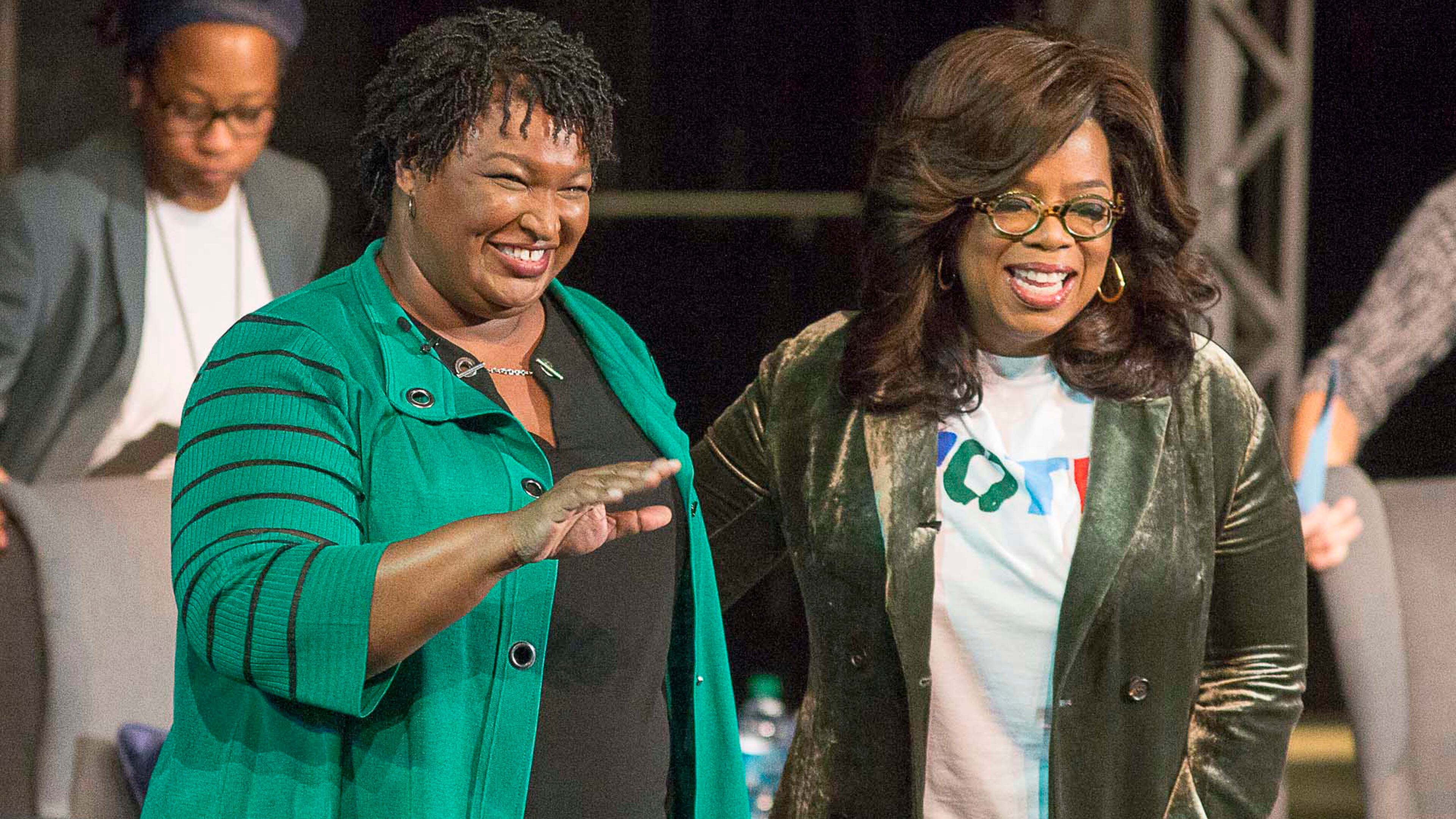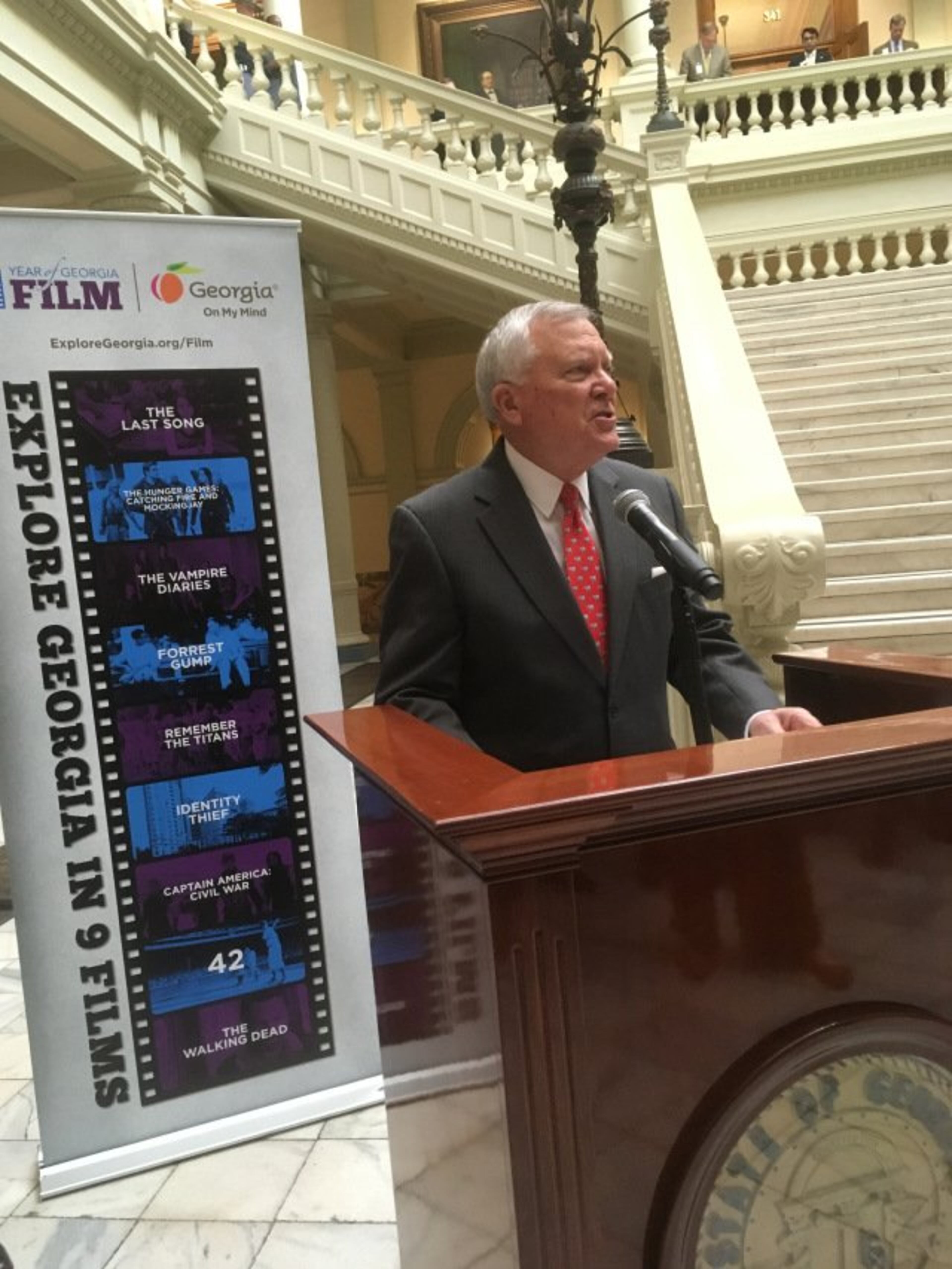Georgia leaders try to stem Hollywood revolt after Kemp’s win

Georgia’s top politicians tried to stem a revolt from some Hollywood executives who threatened to boycott the state’s booming film industry after Brian Kemp won the race for governor, urging moviemakers not to take their frustration out on thousands of workers who depend on their investments.
“The hard-working Georgians who serve on crews and make a living here are not to blame,” wrote Democrat Stacey Abrams, whose campaign for governor benefited from the filmmaking industry’s support, in a message on Twitter. “I promise: We will fight – and we will win.”
I appreciate the calls to action, but I ask all of our entertainment industry friends to support #FairFightGA - but please do not #boycottgeorgia. The hard-working Georgians who serve on crews & make a living here are not to blame. I promise: We will fight - and we will win.
— Stacey Abrams (@staceyabrams) November 18, 2018
And the governor-elect’s campaign tried to tone down the rhetoric, with a statement Sunday reinforcing his support for the film tax credit and asserting that “it’s time to move past divisive politics and work together toward a safer, stronger Georgia.”
The threats came from a handful of prominent movie industry insiders after 10 days of post-election drama ended with final vote tallies showing Kemp edged out Abrams by roughly 55,000 votes. Abrams ended her campaign with a fiery speech in which she announced a new group to challenge Kemp's "gross mismanagement" of the election in court.
There are over 20 productions shooting in Georgia.
— Alyssa Milano (@Alyssa_Milano) November 17, 2018
Is the entertainment industry willing to support the economy of a totally corrupt state that suppresses democracy; where the winner isn’t the best choice for the people but the best schemer or crook?
Some of the Hollywood critics voiced concern about Kemp's support for a controversial "religious liberty" measure that Abrams staunchly opposed, as well as claims that Kemp abused his role as secretary of state to suppress votes and boost his campaign for governor.
Brian Kemp is a corrupt, homophobic, unapologetic disenfranchiser of African American voters. If he seizes power, Hollywood needs to use it’s leverage and pull out of Georgia. Studios need to put their money where their mouth is and stand up to hate. #boycottgeorgia
— Bradley Whitford (@WhitfordBradley) November 8, 2018
Several actors used a #BoycottGeorgia hashtag on Twitter, including actress Alyssa Milano — who shot Netflix's "Insatiable" in Atlanta, "West Wing" actor Bradley Whitford, actor Steven Pasquale and Ron Perlman.
“To all my friends who are studio and network executives,” wrote Perlman, a producer and actor, “if you choose to shoot movies and tv in Georgia, don’t bother to call me.”
Hollywood South?
The film industry has exploded in Georgia since the tax incentives were first signed into law in 2005, turning the state into one of the most popular filming locations in the world and spawning a string of studios, editing hubs and post-production businesses that cater to filmmakers.
Gov. Nathan Deal has jealously guarded the tax credit from any threat from fiscal conservatives who want to weaken the program, which is the most generous in the country in terms of direct payouts in part because it doesn’t cap the incentives.
His office said in August that a record 455 productions were shot in Georgia in the last fiscal year, garnering a record $9.5 billion economic impact and $2.7 billion in direct spending.
The program is so popular, in fact, that Kemp and other leading Republicans all supported the tax credits during the primary earlier this year - even as they called for reviews or the elimination of other tax breaks they described as wasteful spending, something that rarely, if ever, actually happens.
Still, that hasn’t eliminated tension between a largely liberal Hollywood establishment and a Deep South state where Republicans have controlled every statewide office for much of the last decade.
One of the biggest flashpoints is a perennial battle over “religious liberty” legislation that supporters say is needed to provide extra legal protections to the faith-based, but critics call state-sanctioned discrimination.
The governor vetoed the legislation in 2016 amid a swirl of threats from filmmakers and other business titans to leave Georgia, and lawmakers haven't passed the measure since. But Kemp has promised to sign a version of the proposal that mirrors a federal law passed with bipartisan support in 1993.
‘Happy middle ground’
And Republicans have regularly targeted the movie industry on the campaign trail, either to galvanize conservative supporters or blast Democrats for benefiting from celebrity support.
In the Republican runoff, Lt. Gov. Casey Cagle called for a boycott of filmmaker Judd Apatow after he criticized President Donald Trump. That led to a rebuke from Deal, who has appeared at red-carpet events in Atlanta and private gatherings in Hollywood to demonstrate his support for the industry.
“The film industry should be very cautious of trying to tell Georgia what its social policies should be. They will get reactions if they go too far,” Deal said in an interview then. “And likewise, the state of Georgia should be very cautious telling them what their social policies should be. There’s a happy middle ground, and so far we’ve found it.”

And Vice President Mike Pence drew headlines when he declared at a string of campaign stops in Georgia this month that "this ain't Hollywood" as he assailed Abrams' high-profile supporters. That led to snickering from Democrats who noted that, in a way, Georgia was Hollywood.
Abrams, indeed, benefited from tremendous support from celebrities, including mega-fundraisers featuring Atlanta hip-hop legends, a string of campaign stops from Hollywood stars and a mega-watt pre-election visit from media icon Oprah Winfrey.
Abrams received heavy financial backing from filmmakers, directors, producers, actors and actresses, musicians and others in the entertainment industry. She collected more than $4.6 million in contributions of more than $100 from California and New York, the two states that dominate the film, theater, and media industries, according to a review of campaign disclosures.
Among her big donors were filmmakers Steven Spielberg ($6,600) and Tyler Perry ($6,600); Milano ($2,750) and fellow actresses Jada Smith ($10,000), Meryl Streep ($1,000), Tracee Ellis Ross ($5,000), Kate Capshaw Spielberg ($6,600) and Tiffany Haddish ($7,500); and actors Will Ferrell ($6,600), Chris Rock ($5,000) and Ben Affleck ($2,500). She also received donations from John Legend ($2,700), Ludacris ($5,000), Marlon Wayans ($5,000), movie director Rob Reiner ($2,000), director Seith Mann ($6,800) and celebrity couple Danny DeVito and Rhea Perlman ($5,000).
Abrams also received backing from the Georgia Production Partnership ($5,000), the Georgia Screen Entertainment Coalition ($2,500) and the Film Workers PAC ($6,600). The groups also contributed to Kemp’s campaign.
When you say #boycottgeorgia, you boycott me paying rent. You boycott raising kids, paying for braces, and trying to make a living.
— Jacob York (@jkobbster) November 18, 2018
All the artists I know in Georgia are mad as hell.
But you saying “boycott Georgia” primarily hurts people who already agree with you.
Georgians in the film industry amplified Abrams’ warnings against a boycott. Jacob York, an actor and writer on a program on Atlanta-based Adult Swim, urged Hollywood executives to think about the lives they would affect if they pull the plug on Georgia productions.
“When you say #BoycottGeorgia, you boycott me paying rent,” York wrote on social media. “You boycott raising kids, paying for braces and trying to make a living. All the artists I know in Georgia are mad as hell. But you saying ‘boycott Georgia’ primarily hurts people who already agree with you.”
Staff writer James Salzer contributed to this article.



